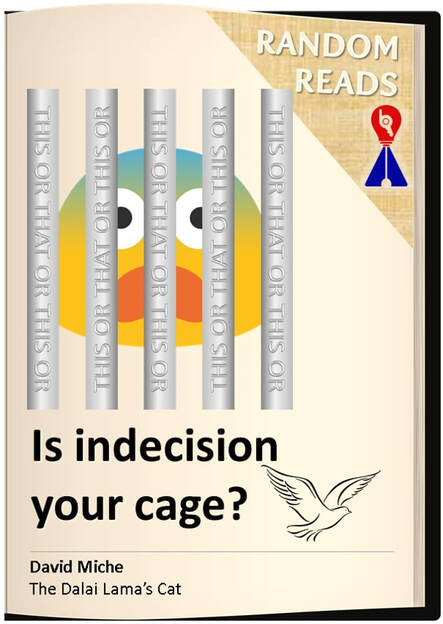|
A tall, slim Tibetan Buddhist monk in his mid-30s, Lobsang was originally from Bhutan, where he was a distant relative of the royal family. He had received a thoroughly Western education in America, graduating from Yale with a degree in Philosophy of Language and Semiotics. Lobsang was also the unofficial head of information technology at Jokhang. Whenever computers were uncooperative, printers turned surly, or satellite receiver boxes switched to passive-aggressive mode, it was Lobsang who was called upon to apply his calm, incisive logic to the problem. After the main modem went on the blink, Raj Goel, technical support services representative of Dharamsala Telecom arrived, looking extremely disgruntled. Face set to a scowl, his manner brusque, he demanded to be shown the modem and the telephone lines coming into Jokhang. Slamming his metal briefcase on a shelving unit with an angry crash, he flicked open the clasps, extracted a flashlight and a screwdriver, and was soon poking and prodding a tangle of cables, while Lobsang stood a few feet away, calmly attentive. Grunting as he got to his knees and followed a particular cable to the back of the modem, the technician muttered darkly about systems integrity, interference, and other arcane matters before seizing the modem angrily, tugging a number of cables at the back, and turning it over in his hands. “I’m going to have to open this,” the technician told Lobsang in an accusatory tone. His Holiness’s translator nodded. “Okay.” Rummaging in his briefcase for a smaller screwdriver, Raj Goel began working on the case of the offending modem. “No time for religion.” Was he speaking to himself? His voice seemed too bold for that. “Superstitious nonsense,” he complained a few moments later, even louder. Lobsang was untroubled by the remarks. If anything, a smile seemed to have appeared on his lips. But Raj was spoiling for a fight. Battling with an unyielding screw as he leaned over the modem, this time he spoke in a tone that demanded a response. “What’s the point of filling people’s heads with silly beliefs?” “I agree,” Lobsang replied. “No point at all.” After a pause, [Lobsang] continued. “One of the last things Buddha said to his followers was that anyone who believed a word he had taught them was a fool—unless they had tested it against their own experience.” Patches of sweat began appearing on the technician’s polyester shirt. Lobsang’s reaction was not the one he was after. “Sneaky words,” he groused. “I see people bowing down to Buddhas in temples. Chanting prayers. What’s that if it isn’t blind faith?” Intention matters “Before I answer that, let me ask you something.” Lobsang leaned against the door frame. “Two calls come in during the morning: one from a customer who accidently overturned a filing cabinet onto his modem, the other from a customer who got so angry with his wife for shopping online that he smashed their modem with a hammer. In both cases, the modems are broken and need to be repaired or replaced. Do you treat both customers the same?” “Of course not!” scowled Raj. “What has that got to do with bowing and scraping to Buddhas?” “Quite a lot.” Lobsang’s easy poise couldn’t have contrasted more starkly with Raj Goel's prickliness. “I’ll explain why. But those two customers—” “One was an accident,” the technician interjected, his voice rising. “The other was a deliberate act of vandalism.” “What you’re saying is that intention is more important that an action itself?” “Of course.” “So, when a person bows down to a Buddha, what really matters is the intention, not the bowing?” It was at this point that the technical support services representative began to realize he had blustered his way into a corner. Not that he was about to back out. “The intention is obvious,” he argued. Lobsang shrugged. “You tell me.” “The intention is that you are begging Buddha for forgiveness. You are hoping for salvation.” Lobsang said after a while, “Enlightened beings cannot take away your suffering or give you happiness. If they could do this, wouldn’t they have done so already?” “Then why do you bother?” The technician was shaking his head as he fiddled with the modem. “As you have already said, the intention is important. The statue of Buddha represents a state of enlightenment. Buddhas don’t need people to bow down to them. Why should they care? When we bow, we are reminding ourselves that our own natural potential is one of enlightenment.” The technician finished his work. On the way back down the corridor, as they passed Lobsang’s office, the translator said, “I have something here that may be of interest.” He ducked inside and took a book from one of the bookshelves lining the walls: The Quantum and the Lotus. Raj read the title before flicking the book open. “You can borrow it if you like.” There was an inscription on the title page from one of the book’s authors, Matthieu Ricard. “It’s signed,” noted the visitor. “Matthieu is a friend of mine.” “He has visited Jokhang?” “I first met him in America,” said Lobsang. “I lived there for ten years.” For the first time, Raj looked at Lobsang closely. That revelation was of far greater interest to him than anything else the translator had said. A week later, a more subdued Raj was back, ostensibly to return the book. It turned out that Raj was keen to go to America. He opened up to Lobsang. Parents, job or dream? Once Raj Goel started, there was no stopping him. “I have friends in New York saying, ‘Come and stay with us,’ and I am very keen to do so, because all my life I’ve wanted to visit the Big Apple and earn real dollars and maybe even meet a movie star. But my parents have chosen this girl, you see, and her parents also want us to marry, and they are saying, ‘America will always be there.’ “Also, my boss is pressuring me to go into management development training, but the loan will tie me to the company for six years and I’m feeling trapped. As it is, work pressure is already overwhelming.” He told Lobsang about the agonies of following his friends on Facebook and YouTube as they traveled around America. How his parents thought that a middle-management position with Dharamsala Telecom was the most he could ever aspire to, but he had his own, more entrepreneurial ideas. How his instincts to spread his wings were in constant tension with the loyalty he felt toward his parents, who had made great sacrifices to give him a good education. Finally, the visitor confessed the real purpose of his visit that morning: “I am hoping you can give me some advice to help me reach a decision.” “I don’t have any special wisdom,” said Lobsang, in the way that especially wise practitioners always do. “I have no qualities or realizations. I don’t know why you think I can advise.” “But you lived in America for ten years.” Raj was vehement. “And … ” Lobsang waited for him to finish. “You know about things.” Raj lowered his gaze as though embarrassed to be admitting this, especially to a man whose mental capacity he had questioned only a week earlier. Lobsang simply asked him, “Do you love the girl?” Raj seemed surprised by the question. He shrugged. “I have seen a photograph of her only once. I’m told she wants children, and my parents want us to have children.” “Your friends in America. How long will they be there?” “They have two-year visas. They plan on traveling coast to coast.” “If you want to join them, you must go—?” “Soon.” Lobsang nodded. “What is holding you back?” “My parents,” Raj retorted somewhat sharply, as though Lobsang hadn’t grasped any of what he’d been saying. “The arranged marriage. My boss who wants me to—” “Yes, yes, the management training.” Lobsang’s tone was skeptical. “Why do you say it like that?” “Like what?” “Like you don’t really believe me.” “Because I don’t really believe you.” Lobsang’s smile was so compassionate, so gentle, that it was impossible to take offense. “Oh, I believe all you say about the training and the parents and the marriage. I just don’t believe those are the real reasons you feel trapped.” Deep furrows had returned to Raj forehead. But this time they were furrows of perplexity. “I thought you would agree that these are important responsibilities.” “What—because I am a Buddhist monk?” chided Lobsang. “Because I’m a religious person who wants to uphold the status quo? Is that why you sought my advice?” Raj looked abashed. “You are an intelligent, inquisitive young fellow, Raj. You have been presented with the opportunity of a lifetime. A chance to become a man of the world and to get to understand a lot more not only about America but also about yourself. Why would you not seize this opportunity?” Lobsang posed this as a serious question, and it was some time before his visitor answered. “Because I’m scared of what may happen?” “Fear,” said Lobsang. “An instinct that prevents many people from taking actions that they know, deep down inside, would liberate them. Like a bird in a cage whose door has been opened, we are free to go out in search of fulfillment, but fear makes us look for all kinds of reasons not to.” Set to fly Raj Goel stared at the floor for a while before meeting Lobsang’s eyes. “You are right,” he admitted. “The Indian Buddhist guru Shantideva had some wise words on this very subject,” Lobsang said. He began to quote: ‘When crows encounter a dying snake, They will act as though they were eagles. Likewise, if my self-confidence is weak, I shall be injured by the slightest downfall.' “Now is not the time to be weak or to let your fears overwhelm you, Raj. You may find that if you face your fears head-on, things may not be as bad as you think. Perhaps, after your parents get used to the idea, they won’t be so disappointed. The arranged marriage can wait. Or maybe in two years’ time, there can be a different match. In the meantime, there are many, many things to look forward to. I am sure you will find America an amazing place.” “I know,” Raj Goel said, this time with conviction. Leaning forward in the chair, he picked up his briefcase and practically jumped up with newfound purpose. “You are definitely right! Thank you very much for your advice!” The two men shook hands warmly. “You may even meet a movie star,” suggested Lobsang. About two months after Raj Goel’s visits, the mail brought a glossy postcard of a glamorous female celebrity. It was for Lobsang from Raj. He was now working for one of the biggest phone companies in America. The photo was of a very famous American actress, whose phone Raj had repaired the previous week.
0 Comments
Leave a Reply. |
Vijayakumar Kotteri
Abstracts from works of different authors. Archives
November 2021
Categories |




 RSS Feed
RSS Feed






